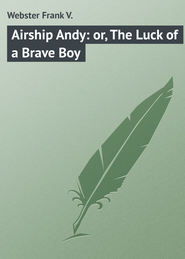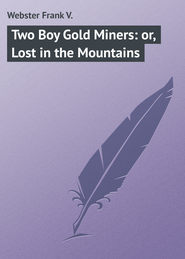По всем вопросам обращайтесь на: info@litportal.ru
(©) 2003-2024.
✖
The Boy Pilot of the Lakes: or, Nat Morton's Perils
Настройки чтения
Размер шрифта
Высота строк
Поля
"He seems to be crowding too close over this way," thought Nat. "Guess I'll give him a caution signal."
He pulled the whistle wire sharply. Short blasts came forth from the Mermaid's hoarse siren. To Nat's surprise the other vessel, instead of keeping away from him, in the narrow channel, seemed to be coming closer.
"Doesn't he know enough to keep away, and on his own course?" said the young pilot half aloud.
He waited with an anxiously beating heart, and at the same time looked around to see if anybody else was near.
"Oh, if only Mr. Weatherby was here now!" he told himself. Never had he missed the old pilot so much as at this moment. For one instant he thought of yelling for assistance, but knew it would be useless, for his voice would not carry far enough. He was in sole charge and must do the best he could.
"Perhaps that other pilot is drunk," he murmured, and then shut his teeth hard. He was "up against it good and hard," and he realized it only too well. He trembled in spite of himself, and an icy chill began to creep up and down his backbone.
He gave another signal. Then, as he watched, he saw the prow of the other vessel turn toward him.
"He's going to ram me!" exclaimed Nat.
Quickly he gave another signal, and then he rang for full speed astern. But it was too late. With a crash the other vessel was upon him, though the result was different from what might have been expected.
The Mermaid was a steel boat, while the Liberty Bell was an old wooden one. Instead of the bow of the latter crashing into the hull of the passenger steamer, the bow of the freight boat crumpled up like paper, being smashed into kindling wood up as far as the pilot-house, part of which was demolished.
There was a confused ringing of bells and blowing of whistles, and then both vessels came to a stop.
CHAPTER XXV
BUMSTEAD'S ARREST – CONCLUSION
With the first sound of the crash Captain Turton and Mr. Weatherby were out of their berths, and on deck. The searchlight of the Mermaid showed plainly what had occurred. Neither boat was dangerously damaged, the passenger steamer hardly suffering at all.
Captain Turton took this in at a glance, and then, with the assistance of the mates, he quieted the frightened passengers.
"How did it happen, Nat?" asked Mr. Weatherby gravely.
"That fellow went wrong!" exclaimed Nat, in his nervous excitement. "Whoever was steering that boat gave the wrong signals. I'm positive of that. Twice I warned him to keep away, but he kept crowding me closer, until he rammed me. It was his fault."
"There will have to be an investigation," said the pilot. "I'm sorry this happened."
"Ahoy the Mermaid!" came a hail from the other boat. "What's the matter with you fellows, anyhow? Can't you keep on your own side of the channel? My bows are stove in, and you've injured one of my men!"
"Who are you?" called back the pilot.
"Captain Carter, of the Liberty Bell."
"It was your steersman's fault," shouted Mr. Weatherby. "Are you in any danger?"
"No, but I'm going to lay-to until morning, and then I want to know who's going to settle for my damage."
"We'll see you in the morning, then," was the pilot's answer.
Nat passed an uneasy night. Though he knew the fault of the collision was not his, he worried lest he might not be able to prove it. There might be an old pilot in the other vessel – a pilot up to all sorts of tricks, who, even if he was wrong, could so make matters appear as to throw the blame on Nat.
"If he does, that ends my career as a pilot," thought our hero.
Soon after breakfast Captain Turton, with the pilot and Nat, went aboard the other vessel. Her bow was quite badly damaged, but the break did not extend below the waterline.
"Did you say some of your men were injured?" asked Captain Turton, when he had greeted the commander of the Liberty Bell.
"Yes, sir, my mate, Joseph Bumstead. His leg is broken."
"What?" cried Nat and the pilot in the same breath.
"Bumstead is his name. I don't see anything peculiar in that," replied Captain Carter, looking at the two in surprise.
"Well, as it happens, there is something peculiar about it," went on Captain Turton. "We have a warrant for his arrest on a serious charge. However, if his leg is broken, he isn't very likely to get away, and I think we can proceed with the investigation. I want to find out who is to blame for this."
"Your steersman, of course," was Captain Carter's quick answer.
"It's natural you should say that. But we'll see."
Several members of the crew of both vessels were called as witnesses. Nat told his story, of how he had tried to warn the other vessel away, and how the steersman of it had persisted in crowding him.
"By the way, who is your pilot?" asked Mr. Weatherby. "I haven't seen him since I came aboard."
"I have no regular pilot," answered Captain Carter. "My mate, Mr. Bumstead, whom I recently engaged, was steering when the collision occurred. He told me he could qualify as a pilot."
"Hum," remarked Mr. Weatherby. "I think it will be a good plan to question Bumstead."
"He's in his bunk."
"Then we'll go there. Come, Nat."
The rascally mate started when he saw the boy, and his face, that was flushed with a slight fever, grew pale.
"Well, you've caught me, I see," he fairly snarled. "But luck is against me."
"Yes, we've caught you in more ways than one," said the pilot.
"How do you mean?"
"I mean that you gave the wrong signals last night, either intentionally or through ignorance, and that you caused this collision."
"Who says so?"
"Half a dozen witnesses. Members of your own crew, for that matter."
"My own crew?"
"Yes."
"I don't believe it."










